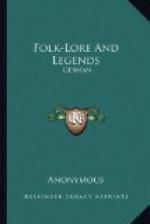Other books they have of involved, abstruse sense,
much like the Rosurcian [Rosicrucian] style.
They have nothing of the Bible, save collected parcels
for charms and counter-charms; not to defend themselves
withal, but to operate on other animals, for they are
a people invulnerable by our weapons, and albeit werewolves’
and witches’ true bodies are (by the union of
the spirit of nature that runs through all echoing
and doubling the blow towards another) wounded at home,
when the astral assumed bodies are stricken elsewhere—as
the strings of a second harp, tuned to a unison, sound,
though only one be struck,—yet these people
have not a second, or so gross a body at all, to be
so pierced; but as air which when divided unites again;
or if they feel pain by a blow, they are better physicians
than we, and quickly cure. They are not subject
to sore sicknesses, but dwindle and decay at a certain
period, all about an age. Some say their continual
sadness is because of their pendulous state (like
those men, Luke xiii. 2-6), as uncertain what at the
last revolution will become of them, when they are
locked up into an unchangeable condition; and if they
have any frolic fits of mirth, ’tis as the constrained
grinning of a mort-head [death’s-head], or rather
as acted on a stage, and moved by another, ther [than?]
cordially coming of themselves. But other men
of the second sight, being illiterate, and unwary
in their observations, learn from [differ from] those;
one averring those subterranean people to be departed
souls, attending a while in this inferior state, and
clothed with bodies procured through their alms-deeds
in this life; fluid, active, ethereal vehicles to hold
them that they may not scatter nor wander, and be lost
in the totum, or their first nothing; but if any were
so impious as to have given no alms, they say, when
the souls of such do depart, they sleep in an inactive
state till they resume the terrestrial bodies again;
others, that what the low-country Scotch call a wraith,
and the Irish taibhse, or death’s messenger
(appearing sometimes as a little rough dog, and if
crossed and conjured in time, will be pacified by
the death of any other creature instead of the sick
man), is only exuvious fumes of the man approaching
death, exhaled and congealed into a various likeness
(as ships and armies are sometimes shaped in the air),
and called astral bodies, agitated as wild-fire with
wind, and are neither souls nor counterfeiting spirits;
yet not a few avouch (as is said) that surely these
are a numerous people by themselves, having their
own politics, which diversities of judgment may occasion
several inconsonancies in this rehearsal, after the
narrowest scrutiny made about it.
Their weapons are most-what solid earthly bodies, nothing of iron, but much of stone, like to yellow soft flint spa, shaped like a barbed arrowhead, but flung like a dart, with great force. These arms (cut by art and tools, it seems, beyond human) have somewhat of the nature of thunderbolt subtlety, and mortally wounding the vital parts without breaking the skin; of which wounds I have observed in beasts, and felt them with my hands. They are not as infallible Benjamites, hitting at a hair’s-breadth; nor are they wholly unvanquishable, at least in appearance.




